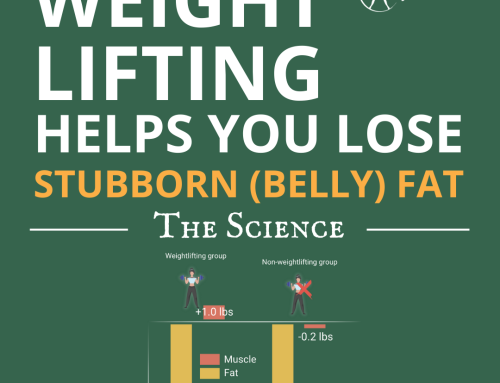
See the bottom of the page for evidence pyramid explanation.
Trying really hard, but not losing fat? So you (desperately) eat even less calories & increase the endless cardio?
At the same time: are you sleep deprived?
- Not feeling refreshed when waking up
- Having “sleep dips” throughout the day
Then you are probably going to burn relatively more muscle mass and less body fat.
Fixing your sleep could potentially more than double your fat loss and save your muscle.
How come?
In 2010, Nedeltcheva and colleagues conducted a highly controlled experiment [study 1].
They put 10 overweight adults through a 2-week period with normal sleep. In another 2-week period they were forced to sleep 2h less per night than normal.
And oh, they could only eat 1300 kcal per day.
Both groups actually lost a similar amount of total weight, but the muscle/fat proportions were very different… In the period with normal sleep they lost more than double the amount of fat, while saving 35% of their hard earned muscle.
A similar study underscores how important sleep is to losing fat rather than muscle [study 2].
Take-away and actions
Research finds that if you are sleep deprived while trying to lose fat, fixing your sleep could potentially more than double your fat loss and save your muscle.
Action points
1. Make time for sleep. Get in bed earlier or get up later.
2. To-do list Take 5 minutes to create a to-do list for the next days to decrease ruminating and fall asleep up to 40 min. quicker. [study 3]
3. Blue light therapy During the dark winter months, every morning for 1-2 hours shine a blue-enriched light on your beautiful face to sleep better at night. [study 4]
Note that participants from this research were not weight training. Weight training is a great way to save or grow muscle while losing fat. Highly recommended.
P.S. If you find *any* credible sources that cast doubt on the information I present here, please make me aware via [email protected] or by a message to my Instagram page.
Research details
1. Nedeltcheva et al. (2010). Insufficient sleep undermines dietary efforts to reduce adiposity
- All 10 overweight adults all ate 90% of their Resting Metabolic Rate in calories per day, which was about 1300 kcal.
- Every single participant underwent 2 conditions for 2 weeks: sleeping 7.5h per night and sleeping 5.25h per night.
- In both sleeping conditions they lost 2.9-3 kg. However, 1.5 kg of this was muscle in the 7.5h sleep group, versus a whopping 2.4 kg in the 5.25h sleep group.
- Limitation: they did not weight train, which may have saved a lot of muscle mass.
2. Wang et al. (2018). Influence of sleep restriction on weight loss outcomes associated with caloric restriction
- 15 overweight men slept like they always did, for an average of 6.3h per night, while 21 other overweight men went to bed later and / or woke up earlier, for 5.7h of sleep per night on average.
- They ate 95% of their Resting Metabolic Rate in calories per day, which came down to 1389 kcal/d for the normal sleepers and 1454 kcal/d for the sleep restricted.
- On average, the sleep deprived lost a whopping 85% of total weight (3.2 kg) as muscle (vs. 17% for the non sleep deprived group).
- After contacting the authors, they told us it’s due to the difference between the average ratio and the ratio of the averages: some outlier results made the figures of the table above possible.
- However: without further inspection it is not clear how the researchers came to the muscle/fat loss ratios they state in the conclusion, since the actual average results per intervention group look as follows (see table).
- I have not been able to replicate these calculations, since I don’t have the data set.However, together with the other evidence on sleep and muscle, it’s safe to say that it’s important to prioritize your sleep if you want to lose fat (and not muscle) when you’re cutting.
3. Scullin et al. (2018). The Effects of Bedtime Writing on Difficulty Falling Asleep: A Polysomnographic Study Comparing To-Do Lists and Completed Activity Lists
- First study in this area to use polysomnography (brainwave recording) instead of self reported sleeping hours.
- Active control group that journalled 5 min. about what they had accomplished the past day
- The alternative hypothesis was that writing a to-do list for the next day will “off-load” those thoughts from consciousness (i.e., Pennebaker-like effects), and thereby make you go to sleep faster.
- The alternative hypothesis group that spent 5 min. writing a to-do list slept up to 40 min sooner than the other group, and the more detailed their to-do list, the sooner they fell asleep.
- The key seems that participants wrote down their to-do list rather than mentally ruminating about their unfinished tasks.
4. Viola et al. (2008) Blue-enriched white light in the workplace improves self-reported alertness, performance and sleep quality
Strength of evidence explanation:











I am glad to hear that it is possible to lose weight by sleeping. Of course, I will try your process.
Hi Daisy,
Rather than making you lose more weight, you will likely lose proportionally more fat (vs. muscle) when you sleep more.
Sounds good! Let me know if you have further questions.
Best,
Stijn
hey!! good tip and I surely apply this in my routein. I like your write-up. Thumbs up and thanks for sharing.